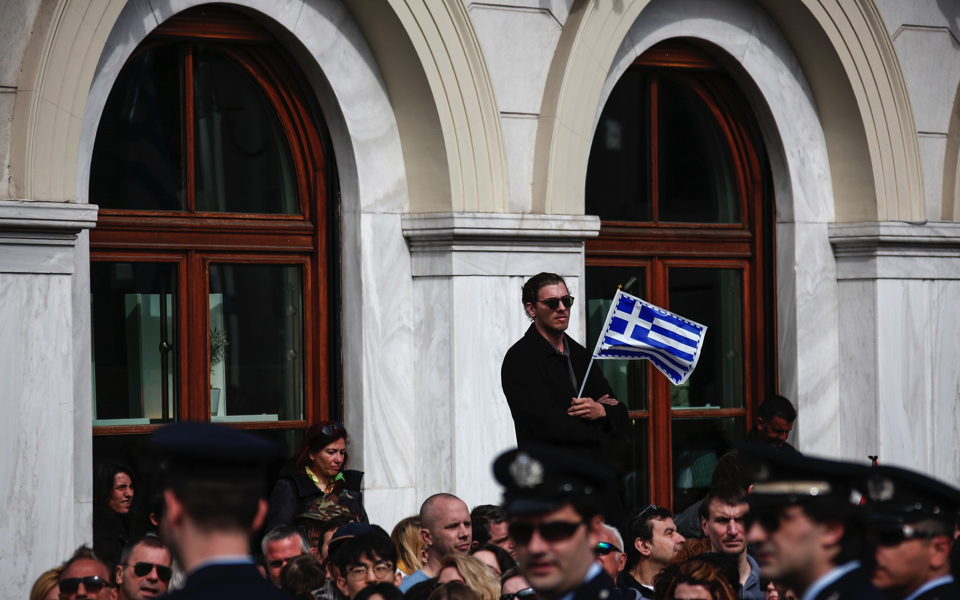Greeks moving back to the future, study shows

Greeks seem to be “returning” to Europe, gradually abandoning the Euroskepticism which had been prevalent in the country in recent years, according to a survey by the DiaNEOsis nonprofit think tank, published exclusively by Kathimerini.
This fourth edition of the survey (the first three were conducted in April and November 2015 and December 2016) titled “What Greeks Believe,” shows that, despite the ambivalence which continues to prevail, three elements are already emerging that could mark the beginning of a new era
Firstly, acceptance of the euro is stronger compared to last year, while the number of those who believe Greece will still be in the European Union in a decade’s time has increased significantly. Based on this belief, there is an almost unanimous desire to accept responsibility for the economic crisis, mainly as a result of our “own weaknesses.”
This admittance is accompanied by a strong demand to wean society off the state. We are now pushing for a smaller state with less intervention in the economy. We are focusing on Europe, developing a sense of responsibility and demanding a different growth model.
It is a triad with clear political characteristics, which may indicate that after a period of denial, anger and protest, an era of self-confidence and creativity has started to dawn.
The responses to the survey questions are cross-referenced for the first time with the vote in the 2015 bailout referendum. They demonstrate that the outcome of the plebiscite did not signify similar divisions on other issues.
However, the survey is not just good news as, at the same time, more conservative views seem to be gaining ground on social issues, while the wider acceptance of certain ideas exposes fundamental contradictions that define the Greek national character.
The fourth edition of this survey was conducted in cooperation with pollsters MRB Hellas and took place between January and February 2018.
European path
Greeks seem to rather impressively balance out unexpected contradictions. Although they easily profess strong commitment to traditional values, customs and perceptions, at the same time they appear to shed the intense skepticism regarding Europe, which was particularly evident over the last three years. An overwhelming 68 percent (from 53.5 pct in December 2016) said that Greece’s participation in the EU has been positive. At the same time, acceptance of the single currency, which stands at 66 percent (from 60 pct), is on the rise.
Of course one should not underestimate the 26 percent of people who want an exit from the euro, the 28 percent who insist Greece should leave the European Union and the 48.9 percent who, under the strain of the economic hardships of the past few years, say Greece has been hurt by its participation in the EU, particularly in terms of economic development and prosperity. We cannot overlook the solid undercurrent of discontent exposed by the 57 percent who believe that Greece’s entry into the eurozone was a mistake and the 58.2 percent who claim that the EU benefited the most from Greece’s membership of the bloc.
All these views clearly stem from a feeling of being deadlocked on many levels, but also from the mixture of pride and victimization which characterizes Greeks. The reassessment of Greece’s position in European institutions could be associated with the unimpeded progress in the implementation of the adjustment program with no political parties attempting to sabotage the economy by cultivating a climate of social unrest.
However, it is also clearly affected by a resurfacing of concerns about peace and security. A total of 84 percent of participants foresee that Greece will still be part of the EU 10 years from now (24.7 pct higher than in Dec 2016). However, 24.1 percent (from 33.4 pct) believe the country’s interests would be better served by a privileged relationship with Moscow. Russians are seen as “good” by 66.9 percent of Greeks while Turks are in the unpleasant position of being viewed as “bad” by 67.7 percent of respondents. Asked about the ideal leader, Russian President Vladimir Putin took first place with 30 percent.
‘We are to blame for the crisis’
For the first time, Greeks are taking responsibility for their mistakes in a very clear way and showing they are ready to take initiatives for a leap forward. Increased confidence in the country’s position in the Europe is buoyed by a dynamic and extroverted request for a new model of economic development with liberal characteristics.
The vast majority of participants (78 pct) still maintain that “the bailouts damaged, rather than helped the country’s growth,” that it was “an invention by Europeans to take advantage of us” (71 pct) and that Greece could have overcome the crisis on its own, without aid from Europe (57.7 pct).
At the same time, however, three in four state that the prolonged crisis is mainly due to “our weaknesses,” which are specified as the “inefficiency and corruption of Greek governments” (92.6 pct), society’s addiction to “borrowing and consuming beyond its means” (77.1 pct) as well as to vested interests and trade unions (66 pct).
The new contradiction is that this courageous self-criticism pushes people who disapprove of the bailouts to favor a liberal agenda (which it could be said is close to the bailout policies). Two in three respondents believe the state has too much involvement in the private sector, while 65 percent demand tax cuts, even if that means restricting state welfare. This is a complete reversal of the views that prevailed on the same subject three years ago. One could argue that the SYRIZA-ANEL government transformed citizens from champions of statism into supporters of the free economy.
The tax raid has led 40.7 percent of citizens to state that tax evasion is a “legitimate defense,” and dissatisfaction with the way the state apparatus functions led two out of three respondents to declare that permanence in the civil service must be abolished, while economic stagnation has sent the percentage of those in favor of foreign investment soaring to 82.7 percent.
The momentum and determination to move away from the traditional “Greek model” of development is also reflected in the demand for the establishment of private universities (60.2 pct) and wide support of “teacher evaluation” (89.5 pct) across all educational levels.
No ‘Macedonia’
The majority of respondents (65.9 pct) reject any composite name for the Former Yugoslav Republic of Macedonia (FYROM) that includes the word “Macedonia.” The question was structured in a different way: At the beginning of the question, and before presenting the dilemma, the survey stated that “after 25 years of an unchanged Greek stance on the name issue, the rest of the world now calls our northern neighbor ‘Republic of Macedonia.’” This wording was enough to raise the “no” to 71.7 percent, which prevails among voters of all parties – even centrist To Potami, with 48.5 percent rejecting a settlement of that sort opposed to 47 percent who approve. The issue almost unites “no” voters of the 2015 referendum with the “yes” voters. The survey found that 68.5 percent of those who voted “no” in the referendum reject the use of the term “Macedonia.” The percentage among “yes” voters is 63.2 percent.
Pride and narcisism
A majority of 54.5 percent (up from 47.2 pct in Dec 2016) said they believe “you are born Greek, you cannot become one,” revealing a mentality that could be interpreted as nationalistic.
Another 74.6 percent believe Greeks are a people with a long history who, despite today’s crisis, stand out for their intelligence and culture, while 68.3 percent say that “Greece is a modern country that does not differ much from other European countries.”
The tendency toward contradiction is reaffirmed by the fact that Greeks appear to have a very good opinion of Greeks as individuals but the worst when it comes to Greeks as a whole. “The Greek stands out for his hard work and professionalism,” argue 86.1 percent of respondents, while at the same time 69.6 percent think “Greeks are primarily focused on private interest, even at the expense of the whole.”





